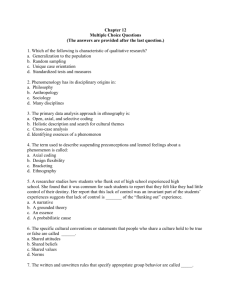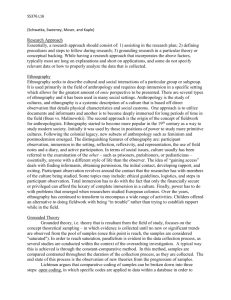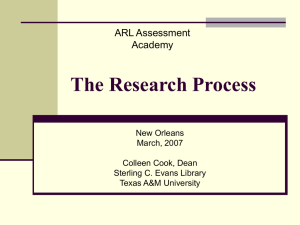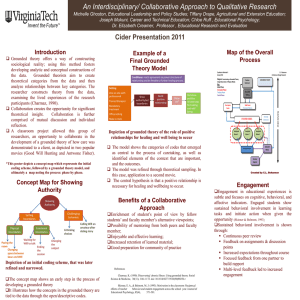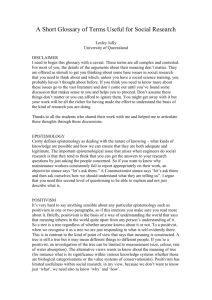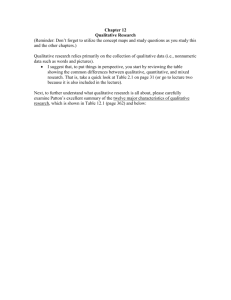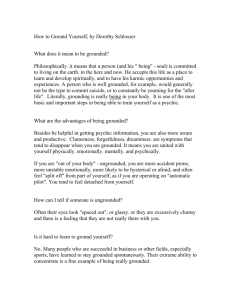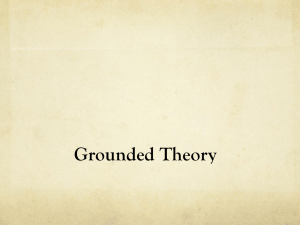Hurlburt Chapter 14 notes
advertisement
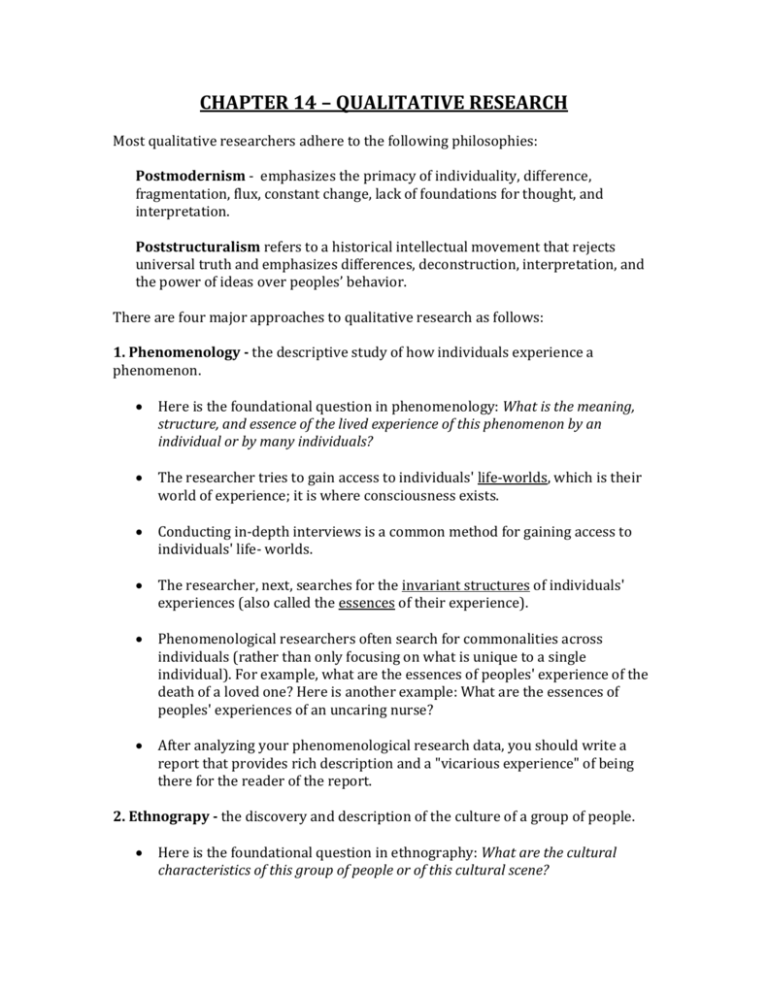
CHAPTER 14 – QUALITATIVE RESEARCH Most qualitative researchers adhere to the following philosophies: Postmodernism - emphasizes the primacy of individuality, difference, fragmentation, flux, constant change, lack of foundations for thought, and interpretation. Poststructuralism refers to a historical intellectual movement that rejects universal truth and emphasizes differences, deconstruction, interpretation, and the power of ideas over peoples’ behavior. There are four major approaches to qualitative research as follows: 1. Phenomenology - the descriptive study of how individuals experience a phenomenon. Here is the foundational question in phenomenology: What is the meaning, structure, and essence of the lived experience of this phenomenon by an individual or by many individuals? The researcher tries to gain access to individuals' life-worlds, which is their world of experience; it is where consciousness exists. Conducting in-depth interviews is a common method for gaining access to individuals' life- worlds. The researcher, next, searches for the invariant structures of individuals' experiences (also called the essences of their experience). Phenomenological researchers often search for commonalities across individuals (rather than only focusing on what is unique to a single individual). For example, what are the essences of peoples' experience of the death of a loved one? Here is another example: What are the essences of peoples' experiences of an uncaring nurse? After analyzing your phenomenological research data, you should write a report that provides rich description and a "vicarious experience" of being there for the reader of the report. 2. Ethnograpy - the discovery and description of the culture of a group of people. Here is the foundational question in ethnography: What are the cultural characteristics of this group of people or of this cultural scene? Because ethnography originates in the discipline of Anthropology, the concept of culture is of central importance. Culture is the system of shared beliefs, values, practices, language, norms, rituals, and material things that group members use to understand their world. One can study micro cultures (e.g., such as the culture in a classroom) as well as macro cultures (e.g., such as the United States of America culture). There are two additional or specialized types of ethnography. 1. Ethnology (the comparative study of cultural groups). 2. Ethnohistory (the study of the cultural past of a group of people). An ethnohistory is often done in the early stages of a standard ethnography in order to get a sense of the group's cultural history. Here are some more concepts that are commonly used by ethnographers: Ethnocentrism (i.e., judging others based on your cultural standards). You must avoid this problem if you are to be a successful ethnographer! Emic perspective (i.e., the insider's perspective) and emic terms (i.e., specialized words used by people in a group). Etic perspective (i.e., the external, social scientific view) and etic terms (i.e., outsider's words or specialized words used by social scientists). Going native (i.e., identifying so completely with the group being studied that you are unable to be objective). Holism (i.e., the idea that the whole is greater than the sum of its parts; it involves describing the group as a whole unit, in addition to its parts and their interrelationships). The final ethnography (i.e., the report) should provide a rich and holistic description of the culture of the group under study. 3. Case Study Research - the detailed account and analysis of one or more cases. Here is the foundational question in case study research: What are the characteristics of this single case or of these comparison cases? A case is a bounded system (e.g., a person, a group, an activity, a process). Because the roots of case study are interdisciplinary, many different concepts and theories can be used to describe and explain the case. Robert Stake classifies case study research into three types: 1. Intrinsic case study (where the interest is only in understanding the particulars of the case). 2. Instrumental case study (where the interest is in understanding something more general than the case). 3. Collective case study (where interest is in studying and comparing multiple cases in a single research study). Multiple methods of data collection are often used in case study research (e.g., interviews, observation, documents, questionnaires). The case study final report should provide a rich (i.e., vivid and detailed) and holistic (i.e., describes the whole and its parts) description of the case and its context. 4. Grounded Theory - the development of inductive, "bottom-up," theory that is "grounded" directly in the empirical data Here is the foundational question in grounded theory: What theory or explanation emerges from an analysis of the data collected about this phenomenon? It is usually used to generate theory Grounded theory can also be used to test or elaborate upon previously grounded theories, as long as the approach continues to be one of constantly grounding any changes in the new data. Four important characteristics of a grounded theory are Fit (i.e., Does the theory correspond to real-world data?), Understanding (i.e., Is the theory clear and understandable?), Generality (i.e., Is the theory abstract enough to move beyond the specifics in the original research study?), Control (i.e., Can the theory be applied to produce real-world results?). Data collection and analysis continue throughout the study. When collecting and analyzing the researcher needs theoretical sensitivity (i.e., being sensitive about what data are important in developing the grounded theory). Data analysis often follows three steps: 1. Open coding (i.e., reading transcripts line-by- line and identifying and coding the concepts found in the data). 2. Axial coding (i.e., organizing the concepts and making them more abstract). 3. Selective coding (i.e., focusing on the main ideas, developing the story, and finalizing the grounded theory). The grounded theory process is "complete" when theoretical saturation occurs (i.e., when no new concepts are emerging from the data and the theory is well validated). The final report should include a detailed and clear description of the grounded theory.
